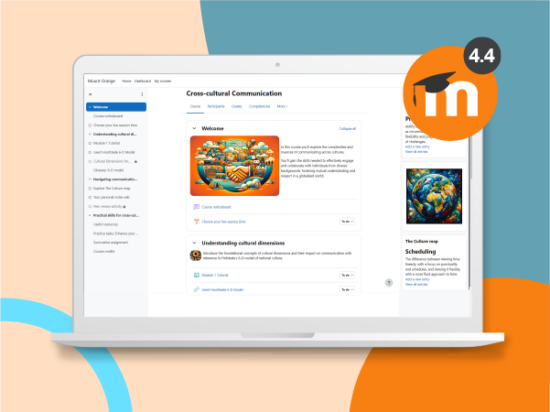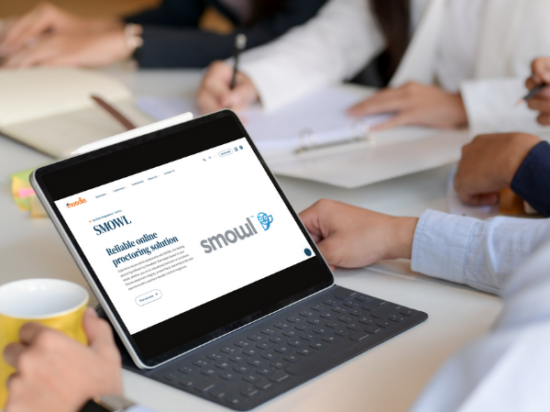If you haven’t heard, we recently turned 18 (an official adult in a lot of countries!) and to celebrate, we’ve been revisiting some of our latest milestones and talking about what makes Moodle so special. Plus we’ve been getting our Moodle community involved by asking you what are your top tips for using Moodle!
Right now, Moodle has over 165,000 Moodle sites around the world – we’ve come a long way since the platform was born around 18 years ago. As part of our ongoing birthday celebrations, we’re sharing our Moodle HQ story with you. So to do that, we caught up with the people that make Moodle tick: our very own Moodle HQ team.
We talk about what it means to be involved with our open-source platform and the ins-and-outs of Moodle, and touch base with each area that makes up the team at Moodle HQ. We’re always on the lookout for ways we can continue the conversation with our community, so keep reading to find out something you may not already know about Moodle HQ!
First in the line up will be our team members that take care of some of our Products, Moodle LMS and Moodle Workplace.
Developing a global open-source project
Let’s start with Sara, one of the Developers and Integrators in the team that keeps the engine running, Moodle LMS Development.
Q: How long have you been working for Moodle HQ and had you been involved with Moodle before joining HQ?
Sara: I’ve been at Moodle for almost 3 years. Before that, I was working for the Ministry of Education of Catalonia. I met Moodle in 2005 and, since then, we’ve become great friends.
Q: So why did you want to work for an open source project vs a closed-source one?
Sara: I’m a true believer in open-source and I will always back it, because of all the benefits it can offer. I love that it can be used and improved by virtually everybody and anybody!
Q: As a developer, what projects have been the most interesting to work on at Moodle?
Sara: In the last year, I’ve been working on Moodle & H5P. Already familiar with the functionality, it was an amazing and interesting experience to be able to work on the project from inception, talking with its key users, finding out how to design it in the best way in terms of integration and, of course, developing it!
It’s been challenging but I’m really happy and proud of the result we’ve created as a team; not just developers but everyone involved in the project, especially the teams in UX and marketing, and our beloved community.


Advancing the world’s most used LMS
While we’re on the subject, we thought we’d catch up with Sander, the Manager behind the Product team at Moodle LMS to talk about his highlights so far and what’s in store for the platform!
Q: When you joined Moodle, the platform was already in its 15th year. In your opinion, what have been some of the cool projects you’ve been involved in with the LMS that’s used so widely around the world?
Sander: My very first project on the LMS team was a challenging one! The goal was to improve our privacy compliance to enable the platform to meet stringent new privacy legislation such as GDPR. We worked very hard across two releases (Moodle 3.5 and 3.6) to get where we needed to. I’m very proud of the end result as Moodle is now a leader in privacy compliance for open source projects and even amongst other commercial competitors.
Q: Can you talk about what the LMS was like when you first joined versus how it is now?
Sander: The look and feel has improved a lot, plus we’ve seen enhancements in terms of compliance, with the privacy features and more recently turning our focus on accessibility.
We’ve done a lot of work on open standards – LTI implementation and other standards such as Open Badges.
Q: How does being open source impact the development and growth of the platform?
Sander: Working together with the community is one of the most important and amazing parts of working in the LMS team. It is incredible to see the passion and knowledge that exists in the Moodle community and I am grateful for the many ways that the community contributes to the platform.
We have members contribute code in the form of bug fixes or improvements, language translations, documentation writers, QA testers and volunteers who help out on the Moodle forums, sharing their expertise with the wider community. It is a key part of Moodle’s success and together with the community we are building a better platform for the world.
Q: You and your team are already working on the next product release, Moodle 4.0, slated for November 2021. It’s going to be a big one! What can we expect to see?
Sander: Moodle 4.0 will be about improving Moodle’s overall user experience. We’ll be building on the usability improvements already made in the last few releases, and taking it to the next level. At the centre of the improvements will be the teacher and student experience. We have a lot of work ahead of us – but it’s an exciting time for the team and the Moodle LMS itself!

Moving beyond education
Ok, so we’ve had a bit of an update about our core platform, the Moodle LMS. One of our latest offerings made specifically for the corporate sector, is up next! We asked Emilio, Product Manager for Moodle Workplace to walk us through what he’s been up to!
Q: How long have you been working for Moodle HQ and had you been involved with Moodle before joining HQ?
I hope I qualify as a long time moodler– I’ve been at Moodle since 2008!
My first encounter with Moodle was on a project at a small IT company. From there, I ended up leading one of the most important eLearning projects in Spain – the transformation of the Spanish Vocational Training system from face-to-face training to e-learning under the Ministry of Education authority.
I liked Moodle and eLearning so much that I co-founded Inserver, a Certified Moodle Partner. Not too long after that, I landed a job here, as Product Manager for Moodle Workplace!
Q: The eLearning landscape has changed a lot in the past 18 years, going beyond the education sector, with businesses incorporating eLearning to train employees. Can you talk about how the role of edtech has influenced the way in which organisations incorporate workplace learning? Has it changed during your time at Moodle?
Emilio: Organisations have always needed to train their staff, this was already true even before Learning Management Systems existed. With the advent of eLearning, companies found out it was a very effective way to optimise organisational training. Not just in terms of cost but, more importantly in terms of quality.
Curiously, even when Moodle was originally designed for education and didn’t have many competitors in that field, companies of all sizes, countries and markets use it to train their staff and customers.
Did it change during my couple of years at Moodle? Yes, definitely! We launched Moodle Workplace last year, and since then it has been a game-changer in the corporate LMS landscape.
Q: What kind of influence do you think learning culture has in the workplace, especially now during Covid-19?
Emilio: 20 years ago L&D was probably not something that corporate professionals ever asked for, but today it’s a serious consideration for some when looking for a new role.
Luckily, nowadays we have the tools and technology to empower L&D professionals to plan, support employees to learn on the job, provide a multi-channel experience and measure outcomes, impact and success.
COVID-19 has pushed us into the remote-first working era, and this is something very few were prepared for. In these uncertain times, technology has the main role in enabling us to foster and maintain a learning culture in the workplace.
Q: How does edtech change how we communicate in the workplace and our learning experience?
Edtech is a vehicle for communication and enables us to have conversations around any piece of learning in context, in the same place where the learning is happening.
Modern edtech tools like Moodle Workplace make the life of L&D professionals easier by automating all the things involved in the background.
Q: So what’s next for Moodle Workplace?
Emilio: We have an exciting year ahead, full of big features coming to the platform!
Upcoming releases will focus on improving the multi-tenancy feature even more by introducing the Shared Space and shared entities. Courses can already be shared across tenants, and with Shared Space we will bring sharing to all of our entities: Programs, Certifications, Department and Positions, Custom reports, Dynamic Rules and so on.
Following from that, we’ll be taking our Report Builder to the next level and releasing it in Moodle LMS 4.0. Plus we’ll introduce a new big feature: the Learning Catalogue. And many other cool things. Stay tuned!


Never stop learning
Next up, we thought we’d have a quick chat with the ones on the frontline with the community, Mary and Helen, our go-to people for all things Moodle!
Q: Hi Mary, you’ve been co-facilitating the Learn Moodle MOOC, which helps people learn how to use Moodle for teaching, since 2013. You’ve witnessed how the need for MOOCs has changed in the education sector. How is it now versus then? How important is the role of training today?
When MOOCs first appeared, they were marketed as revolutionising education. For various reasons, that hasn’t really happened, but what has changed is that people now demand quality training for free, and with digital evidence (such as Open Badges).
We currently run 3 courses on the Learn Moodle site: all are free, regularly updated and offer digital badges and certificates as proof of completion. In times when budgets are tight, online courses such as free MOOCs are a good way for staff to undertake professional development.
Q: From your experience Mary, do you think organisations approach training and staff development differently now versus 10 years ago? How has this impacted the way in which people use Moodle, in your opinion?
Mary: Although COVID-19 forced the need to learn to teach entirely online, in recent years, it’s become increasingly expected that there will be an element of online learning in study programs. Blended learning is now pretty much the norm and many organisations require staff to be digitally competent. That’s one of the reasons we developed the Moodle Educator Certification, as a way for educators to demonstrate that they are not only proficient in teaching online but also skilled in using Moodle to maximise learning opportunities.
Q: Helen, our platform is backed by a strong community of Moodlers. How do you think that makes Moodle what it is today?
Helen: The Moodle community is truly amazing, with so many people volunteering their time and expertise for free, not only in writing code but in areas such as translation, documentation, user support (via moodle.org forums), QA testing, theme design, bug reporting and suggesting improvements.
With so much input from Moodlers all over the world, Moodle has become very feature rich. Moodle is also incredibly customisable, with plugins (available in the Moodle plugins directory) to add more features and functionality, themes for changing the look and feel, and lots more!
Q: What advice can you give to people who are new to Moodle?
I recommend visiting Learn Moodle and signing up for one or two of our free MOOCs. As well as learning about some of Moodle’s features, you’ll also experience it as a student!
As mentioned often in all of the MOOCs, you can discover more about Moodle’s features in Moodle Docs, our documentation wiki, and if you have any questions, you are welcome to post them in a forum on moodle.org, where we have communities in many languages.
Finally, if you decide you would like to be involved in the Moodle project, please see our guide Contributing to Moodle.


Thanks Helen! And thank you to all of you for taking a moment to chat!
That’s a wrap for our Q&A with Moodle HQ! There’s always something new to find out about Moodle and everyone behind the scenes making things happen. Are you keen to know more? Learn about Open Source and the Moodle story.



